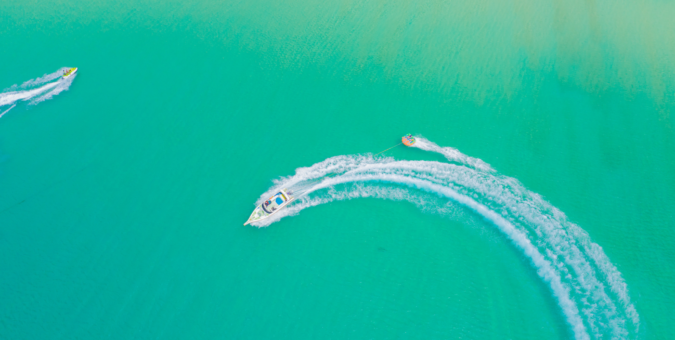
Summer holidays are well and truly underway and once you get to your destination many will be heading to the beach to relax.
From the shade of your parasol, you may be tempted to partake in any number of water sport activities from jet skiing, parasailing, surfing, snorkelling or even diving. If you are further inland your options might include canyoning, kayaking or other water activities on a lake or inland waterway.
Whilst some people may have prearranged their activities or may be enjoying an activity holiday, many will participate in these activities as the result of a spur of the moment decision. Most activities will be well-organised but some may be rather more questionable. You should bear in the mind that activities abroad will not be required to reach the same safety standards as apply in the UK. There is no harmonised legislation across Europe in respect of the operation, management and use of water sport equipment and each country will have its own requirements.
What questions do you need to ask before taking part in water sports?
Before parting with any cash you should take a moment and give some consideration to the dangers of participating in these activities and ask yourself a number of questions. Whilst on holiday it is easy to become complacent and forget about the realities and risks of something you are about to do.
The ROSPA provides some helpful guidance on water safety abroad which is worth reading. Watersports safety abroad – RoSPA One of their concerns is the lack of information available which would enable tourists to make informed decisions when taking part in water sports whilst on holiday.
Along with providing statistics on drownings whilst on holiday they provide helpful tips to consider if you do wish to undertake certain water sports whilst abroad.
Along with tips on the water sport itself below is an example of some of the points to consider in respect of the operator of those activities:
- What is the condition of any equipment and how is it stored and cared for? Sea water, sun and sand can corrode water sports equipment so items should be washed off with fresh water and stored out of the sun.
- Make sure any buoyancy aid and/or helmet fits correctly and is in good condition;
- Check where any activities are taking place. Is the area large enough to keep you safe from others who may also be participating in water sport activities?
- You should be asked to provide personal details, including where you are staying and any relevant medical conditions in case of an accident. A full safety briefing should be provided and questions asked as to your confidence both in the water and with the equipment.
- How many staff are there? The advice is that one-man operations are unsafe for a number of reasons. If the operator is busy with customers who is looking out for your safety and who will rescue you if there are problems? For this reason an operation with a number of staff should be better equipped to deal with any issues.
- Does the motorboat driver themselves wear a buoyancy aid and use a kill cord so that the engine will cut out if there is an emergency – particularly if something happens to the driver themselves.
- Is there communication between a driver or look out on the boat and observers on the beach?
- Is there a first aid kit and other safety equipment at the base?
DOes my Travel Insurance Cover Water Sports?
Once you have selected an operator you are satisfied with, you should double check your travel insurance policy to ensure that you are covered for any activity that you intend to participate in. Most policies cover an extensive list of activities as standard however, some activities such as banana boating, white water rafting or swimming with elephants may not be covered as standard and may require you to pay an extra premium in light of the increased risk involved. Any additional premium is not usually significant and in the long run would be money well spent if something were to occur.
Payment for water sports activities
If you do decide to go ahead with an activity, depending on the cost, ideally you should try and pay with a credit card so that you may be able to benefit from some of the protections under Section 75 of the Consumer Credit Act if something does go wrong.
Keep any receipts for monies paid and also keep a copy of any disclaimer you might be asked to sign before you participate in the activity.
If you have any leaflet advertising the activity keep it to hand as this should have contact details for the operator if you need to contact them at a later date.
If an accident does occur
If you are unfortunate enough to be involved in an accident abroad whilst participating in a water sport or activity it is important that you seek specialist legal advice. The laws that apply will generally be of the country where the accident occurred and time scales within which claims must be pursued vary greatly from country to country. Some times limits can be quite short so it is important that you do not miss an opportunity that may be available to you. Investigations can take time to conduct and certain procedures may need to be followed in order to obtain relevant documents.
It would also be helpful to take the following steps whilst you are still in location:
- Take photographs of the equipment involved, accident location, operation base, and any signage;
- Get details of the operator of the activity, their insurer and police and other services who may have attended the scene;
- Get details of any one who may have witnessed the incident to include their full name, address and mobile number;
- Make enquiries as to whether there is any CCTV footage. Oftentimes someone may have videoed the incident on a mobile phone;
- Keep any documents such as receipts for the activity and flyers that you may have relied upon in making your decision to take part in the activity;
- If an accident report is prepared try and get a copy and don’t sign anything that you don’t understand;


















